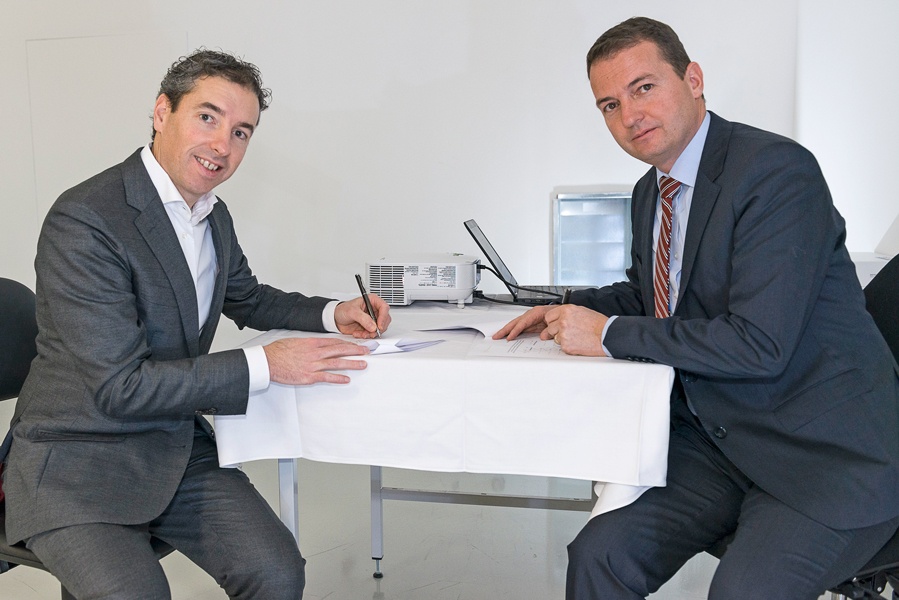
GKN Sinter Metals reportedly became the first automotive supplier in the world to begin series production with 3D printing using a MetalFAB1 AM machine from Additive Industries. The company spoke to Additive Industries CEO Daan Kersten about the technology.
What makes your system stand out compared to conventional systems?
What really differentiates us is that from the very beginning we designed our system for series production. Other systems in the market were developed for prototyping, which means current systems are mainly set up for printing one-off parts and there is quite a bit of manual labor involved. Our MetalFAB1 system for series production is fully integrated and includes pre and post processing steps like stress relief heat treatment. Besides that we have automated both powder and build plate handling so there is next to no manual labor involved. The MetalFAB1 modular architecture also affords the user flexibility with the option of expanding the scope of the process to increase productivity as needed.
Tell us about the GKN and Additive Industries partnership .
Our partnership started when GKN bought the MetalFAB1 Beta machine and entered our Beta program to test the system, provide feedback on performance and help us to improve the system process and machine operation. GKN and AI are now beginning to focus on how to improve the use of GKN powders and explore the possibilities of using water-atomized powders. In terms of our integrated AM series production system, total cost per part is crucial, so we continue looking at lowering these costs for 3D printed parts by eliminating labor, reducing the system costs and increasing productivity.
Additive manufacturing in the automotive industry: what are the main challenges from a machine builder perspective?
In the automotive industry the requirements are high in terms of productivity, reliability and predictability. Together with GKN, we plan to drive improvement of both performance and cost levels. We really want to work on system development for larger volumes, and as a major player in the automotive supply chain, GKN’s know-how in automotive production is important, as they produce 11 million car parts per day. Because they are so intimately familiar with high volume production, they are a suitable partner to help us test our system in light of those stringent automotive requirements.
Which new approach can you as young company bring into a rapidly developing environment?
While we are a relatively new player in the metal AM industry, the market is developing so fast that we have already established ourselves on the market. We understand the experience of existing users of this technology. When we started developing equipment and software, we interviewed them, compiled their clear list of requirements and then fed this in to our work as we developed the system. What we learned was that the industry’s rapid growth had allowed existing machine builders to neglect suggestions for improvement. The market was such that players were able to sell what they built, meaning the incentive to change was relatively low. This was reinforced by resistance to changed machine specifications by regulated markets like medical and aerospace where change often means expensive recertification. As a newcomer, we had no legacy, we could think freely and develop a completely different concept. So we defined a new category in metal additive manufacturing with our series production system.
Which major markets do you see for the future of AM?
The current markets for additive manufacturing – for instance aerospace, automotive, medical and high-tech components – are high-end markets. We think that the MetalFAB1 system is competitive in terms of total costs per part and so the technology also lends itself to other markets such as oil and gas and general machine building. Together with GKN, we will continue working on lowering costs per part to a level where we can compete with casting, and thus open up a large new market.
What is your vision for Additive Industries in the Metal AM area?
Currently we’re focusing on improving the systems for true series production together with our customers to make sure they have a best business case. We aim to be industrial leader in metal AM for prototyping, small series production and large series fabrication. After having established our position in Europe from the start, we are now ready to expand into new geographic areas, for instance with a process and application development center in the USA and then enter the Asian market next year. Our geographic growth is largely driven by the tremendous interest those markets have expressed in our products.
After launching our system in 2015 we sold four Beta systems – GKN has one – and in the meantime also the first production series machines are installed, for example at BMW. This confirms the market appetite for series production equipment, and we expect to continue growing as we have large demand in our sales pipeline and we are committed to capturing the opportunities out there. Our collaboration with GKN, with our joint expertise in equipment, software, materials and end-user applications, is important to further develop and improve this technology and its implementation.
This story uses material from GKN and Additive Industries,with editorial changes made by Materials Today. The views expressed in this article do not necessarily represent those of Elsevier.




